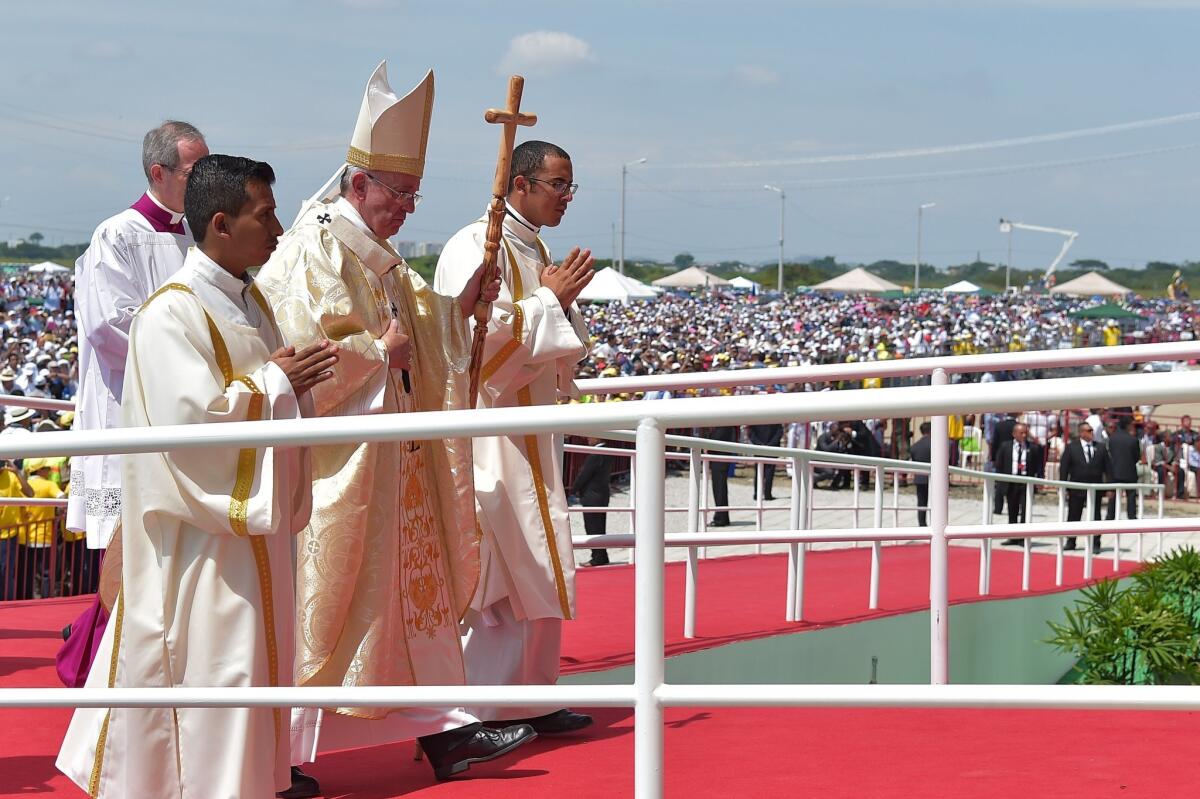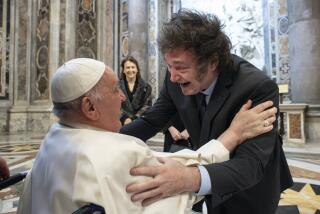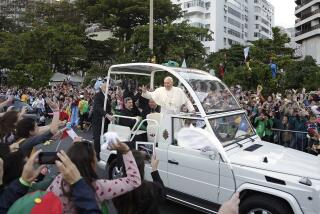Pope Francis’ Mass in Ecuador focuses on family, draws multitudes

Pope Francis arrives to celebrate an open-air Mass at Parque Samanes in Guayaquil, Ecuador, on Monday.
- Share via
Reporting from Quito, Ecuador — Hundreds of thousands of cheering people welcomed Pope Francis to Guayaquil, Ecuador, on Monday for the first Mass on the Argentine-born pontiff’s landmark pilgrimage to Spanish-speaking Latin America.
Enthusiastic crowds thronged Francis as he walked from the airplane that took him from the Ecuadorean capital, Quito, to the coastal city of Guayaquil. Many tried to shake his hand and took selfies with the widely admired pope. Still more lined the route that the popemobile took to the site of the Mass.
Preliminary estimates of attendance at the Mass, in Guayaquil’s sprawling Parque Samanes, topped half a million. The pope dedicated the service to the traditional family, the promotion of which he believes can stave off many of society’s ills, especially in impoverished Latin America.
“The family,” he said, speaking in his native Spanish, “is the nearest hospital ... the first school for the young, the best home for the elderly.
“The family constitutes the best ‘social capital,’” he continued. “It cannot be replaced by other institutions. It needs to be helped and strengthened, lest we lose our proper sense of the services that society as a whole provides.”
Those services should not be regarded as charity but as part of the “social debt” owed the institution of family, he said to sustained applause.
Illness, unemployment and other “difficult situations” can rob families of their warmth and sense of solidarity, he warned.
As expected, the pope departed from his prepared text on several occasions. At one point, as he spoke of how all members of a family are to be valued, he paused to recall an anecdote involving his mother. He said she was asked once which of her five children she loved the most. She responded that the five were like the five fingers on her hand; hurting any one of them would hurt her equally.
The pope is on an eight-day visit to his native continent, deliberately choosing three of its poorest and most marginalized countries to drive home his belief in preaching “from the periphery,” or among the most disadvantaged. After Ecuador, he will travel to Bolivia and then Paraguay. In addition to meeting with clergy and national officials he will made a point of spending time at so-called places of pain — including a children’s hospital and a notorious prison.
The is Francis’ second trip to South America since becoming pope. His first, in 2013, was limited to Portuguese-speaking Brazil for World Youth Day.
Earlier Monday and shortly after his arrival in Guayaquil, the pope stopped to pray at the Divine Mercy shrine, where he blessed sick faithful and then chatted with the staff members who care for them. In his typical joviality, he said to the staff: “I will bless you, and I won’t charge.”
Leaders of the Roman Catholic Church credit Francis’ popularity with stanching an exodus from the faith and attracting people back to the fold. It is too soon, however, to bear that out with numbers.
The countries the pope is visiting are among the most Catholic in South America.
Francis was scheduled to meet later Monday with Ecuador’s leftist president, Rafael Correa, who also greeted the pontiff on the tarmac at his arrival in Quito on Sunday.
People began gathering at the Quito cathedral Monday afternoon to hear the pope speak that night.
“It is a blessing that the pope has come, a signal of joy,” said Angel Tapia, a 44-year-old IT engineer. “I think the pope came because he wanted to, not because the president invited him. But political tension will return once the pope is gone.”
Though most of the pope’s public comments at the Mass in Guayaquil were heavily religious and Bible-based, many in Ecuador hope he will stake out a more political position.
“The visit of the pope comes at a critical moment for the country, because the division between those who support the government and those who criticize it is at its highest point,” said architect Diego Moreano, 35, among those on the streets attempting to get a glimpse of the pope. “The pope can serve as a point of balance, of social stability and peace. Let’s hope his message lowers tensions.”
Fabiola Cruz, a 50-year-old homemaker, said she hoped the pope could revive the “spirituality” of the people of Ecuador. “Unfortunately we live in a moment of little reflection in our country.”
Special correspondent Jaramillo Viteri reported from Quito and Times staff writer Wilkinson from Mexico City.
Follow @TracyKWilkinson on Twitter for more news from Latin America
More to Read
Sign up for Essential California
The most important California stories and recommendations in your inbox every morning.
You may occasionally receive promotional content from the Los Angeles Times.











